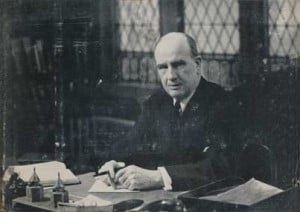Even His Name Spoke of Recognition
 Born on this 18th day of September of 1879,Clarence Edward Noble Macartney had one of those names that made you stop and think. He grew up in a Covenanter household, with his father, the Rev. John L. Macartney, being a minister in the Reformed Presbyterian Church of Northwood, Ohio. As this town was the home of Geneva College, it was no surprise that his father taught at the new college as a professor of Natural Science. When the college moved to Beaver Falls, Pennsylvania, the family moved with it.
Born on this 18th day of September of 1879,Clarence Edward Noble Macartney had one of those names that made you stop and think. He grew up in a Covenanter household, with his father, the Rev. John L. Macartney, being a minister in the Reformed Presbyterian Church of Northwood, Ohio. As this town was the home of Geneva College, it was no surprise that his father taught at the new college as a professor of Natural Science. When the college moved to Beaver Falls, Pennsylvania, the family moved with it.
But the father was not a well man. Plagued with a respiratory problem, he and the family moved to California for the warmer weather. In fact, twice there was a move in that state, and finally on to Colorado in 1896. There were teaching professions along the way for the father.
All this moving brought a series of schools, which did not stop for the young man Clarence during his collegiate years. They included: the University of Denver, the University of Wisconsin at Madison, Harvard, and Yale Divinity School. There was even a stint overseas in several countries. Finally, Clarence McCartney settled down at Princeton Theological Seminary, where he studied under B.B. Warfield, Robert Dick Wilson, and Frederick Loetscher.
The Old School Presbyterian theology called him away from the Covenanter denomination of his father and into the Presbyterian Church in the U.S.A. Ordained soon after seminary, he held pastorates first in Paterson, New Jersey, and then in Philadelphia and Pittsburgh, Pennsylvania.
Macartney was no doubt a conservative in theology. His Old School Presbyterian training at Princeton Seminary had guaranteed that, along with his Covenanter background. And he was to preach that famous sermon, “Shall Unbelief Win?” to counter the Rev. Harry Emerson Fosdick’s sermon earlier, “Shall Fundamentalism Win?”
In its early years, he was a member of the board of Westminster Theological Seminary. One of his favorite professors at Princeton was Robert Dick Wilson, who was at Westminster for one year before death took him. But McCartney was opposed to the starting of the Independent Board for Presbyterian Foreign Mission as well as the Constitutional Union’s calls for a new church, if they couldn’t reform the church from the inside. Eventually, he would resign from the board of Westminster Seminary and remain inside the Presbyterian U.S.A. church, even while Machen and others were censured out of the church. He would go to be with the Lord in 1957.
Words to live by: It comes down to a simply question. What is the definition of an apostate church? J. Gresham Machen and others certainly believed that when nothing is done in the way of church discipline when essential doctrines of the faith have been denied, as was the case with the Auburn Affirmation, then that speaks of a visible church being apostate. Not one single signer of this affirmation was ever brought up on a charge of heresy. Who were brought up for violation of their ordination vows were conservatives like Machen, Woodbridge, Woolley, McIntire, and yes even a David K Myers, among others. Pray for the purity of the church and your church in particular. Don’t ever be silent when the truths of God’s Word, the Bible, are being attacked. And stand for the faith once delivered unto the saints.
Tags: Samuel James Pierce
-
I have always admired Macartney since I learned of his stand as a fundamentalist, in the good sense of the word, contra the liberals in the early years of the twentieth century. One of his sermons, “Come Before Winter”, is movingly proclaimed by Max McLean in a release by Ligonier. His first church was in Paterson, New Jersey, where I grew up. You may want to change the spelling of that city in your blog post. I have always been interested in why Macartney stayed in the mainline Presbyterian Church, as did John Gerstner, Sr., I believe. This contrasts with many other faithful men who left that body, and are leaving right now, in the wake of its decisions this past summer regarding human sexuality. There is a good book there somewhere, to consider the contrast both theologically and historically, in an irenic manner. Has it already been written?

1 comment
Comments feed for this article